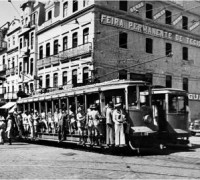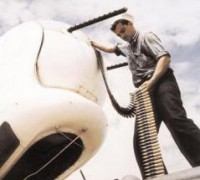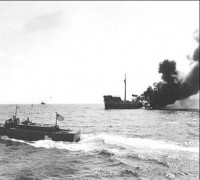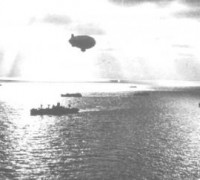- THE HARD ROAD TO WAR
3)DECEMBER 7TH 1941 *
THE AFTERMATH OF PEARL HARBOUR ATTACK
https://www.youtube.com/watch?v=5TpzWon_QV0&t=511s
In view of the dramatic events of December 7th 1941, the facts spoke for themselves and the alliance between Brazil x U S took a no return course and 4 days after Pearl Harbor, the first US Navy squadron then, VP 52 composed by 9 PBY-5 Catalinas and the Seaplane Tender Clemson landed at Natal. Two weeks later, 50 marines arrived, to patrol the base. The primary task of this spearhead: To make initial contact with Brazilians, familiarizing with the new and unknown scenario and perform the first patrolling duties off Brazilian coast to hunt and destroy submarines, blockade runners disguised raiders, as well as securing the free shipping lanes for merchants. In January 1942 Americans felt the taste of the war in the Atlantic when German submarines laid havoc on merchantmen on U S East coast.
There was a real threat to Northeast Brazil and its airway system. So the US Army planning division in view of the critical situation proposed one infantry regiment to be sent immediately to the Natal area. The means of transportation was the same attributed to one scheduled to land at Portuguese possession of Azores. Army air units were also to be deployed in Brazil as soon as possible. Admiral Stark agreed at first to send 3 companies of marines, each one numbering 50 men with the primary task to guard the newly built airfields of Belem , Natal and Recife. Brazilian president Vargas agreed to receive the guards, but with the pre condition that these troops would be allowed to disembark unarmed and serving as aircraft maintenance technicians. Once again one more stumbling block to be removed in the diplomatic field, for Americans wanted these troops the task of guarding the airbases fully armed.
Once the matters were clarified, one warning message was forwarded to the commanders of the 3 garrisons emphasizing that the men were in a sovereign country in an unusual situation by the express authority of Brazilian President and this was a fact to be taken into consideration as a clear evidence of Brazilian will to collaborate in the framework of continental defense and that those men would behave as truly and sincere friendly allies of Brazilian Army, Naval and civilian authorities as well. Once these instructions were fully assimilated, the 17th, 18th and 19th Marine companies left southern Florida naval base of Quantico on 15th December. On 17th, the spearhead of the first American armed unit ever to set foot in South America landed in Trinidad.
There, the commanders took notice of one more setback. The Brazilian government took a step back and now announced the US marines would not be allowed to disembark in Belem bearing arms or even in uniform. On 19th, after intense diplomatic effort, President Vargas finally gave the consent for the troops to land in uniform, however one demand was made regarding the arms; they were to be left in their crates, and kept out of sight. Being so, the first company landed at Belem on 19th December 1941.
In the following day the remaining two garrisons proceeded to Natal and Recife. There they discovered that local authorities had not been informed in full extent about the ultimate determination of President Vargas and they were ordered to remain offshore in US Navy ships until new instructions were relayed through the appropriate channels clearing their attributions then ashore. That troublesome arrival was one more indicator of the problems Americans would face concerning the guard of airbases.
During the conference, sub secretary Summers Wells announced that Peru, Bolivia and Paraguay decided to support the U S led declaration which recommended the breaking of diplomatic relations by all South American nations with Axis powers in exchange of economical aid and the immediate shipment of military equipment. He stressed in the occasion the importance of Brazil in the continental strategy of defense and by inference the country could not be placed in secondary position as a host for American troops deployed in its territory.
Summer Wells also emphasized Brazil was a friend and an important ally of US and had rights to receive through lend – lease all adequate military equipment for its needs like fighter aircrafts, patrol planes and medium bombers, tanks and coastal artillery suffice to provide northeast coastline with a minimum capability, whose defense seemed absolutely vital and also to forestall any landing attempt by Axis. Roosevelt informed on the correctness of his sub secretary positions and agreed with Brazilian demands although halfheartedly.
The Roosevelt administration saw with grounded suspicions the fact that Brazil was linked to Axis powers by strong ties both economical and diplomatic, especially with Germany, therefore remaining reluctant before Brazilian government hard pressing for arms supply. After all, the conference if not succeeded for American standpoint at least approved a series of resolutions that fostered the collaboration of all Latin American nations with the United States war effort.
Latin Americans from then on, were deeply committed to open their vast natural resources to provide all necessary strategic raw material for the US war industry, to create adequate conditions for the free traffic of financial assets, to increment Inter American commercial relations, to develop the strategic materials production, to keep the shipping lanes free, to control all financial operations of Axis, to increase mutual investments and exert a tight grip in internal front to stave off any danger to the political agreements made with the US.
The fact that no military agreement have been achieved during the conference, spawned great disappointment among certain niches of Brazilian armed forces eager for an effective participation on allied side in the incoming world conflict. On this regard, the resolution was very limited itself and proposed the establishment of a bureau of studies on the continental defense, i.e. An organism which superficially aimed to encourage the continental solidarity in military sphere, otherwise to assume a relevant defense role in the region.
As part of his strategy of negotiation of Brazilian alignment with the U.S, President Vargas, delayed to the very last minute the announcement of the breaking of diplomatic relations with Axis powers. When the word came from president Roosevelt assuring his compromise for supplying the armed forces with update equipment, Brazil then finally severed diplomatic relations with Germany, Italy and Japan in the final day of the conference on January 28th 1942.
From then on German reprisals against Brazil took place when several merchantmen were sunk along US east coast. Late in August German submarines tighten the grip on shipping lanes when U-boat U-507 alone sank 5 Brazilian merchants on the coast of the state of Sergipe, killing hundreds of people. The act led Brazilian President Vargas to declare a state of war against Axis powers.



